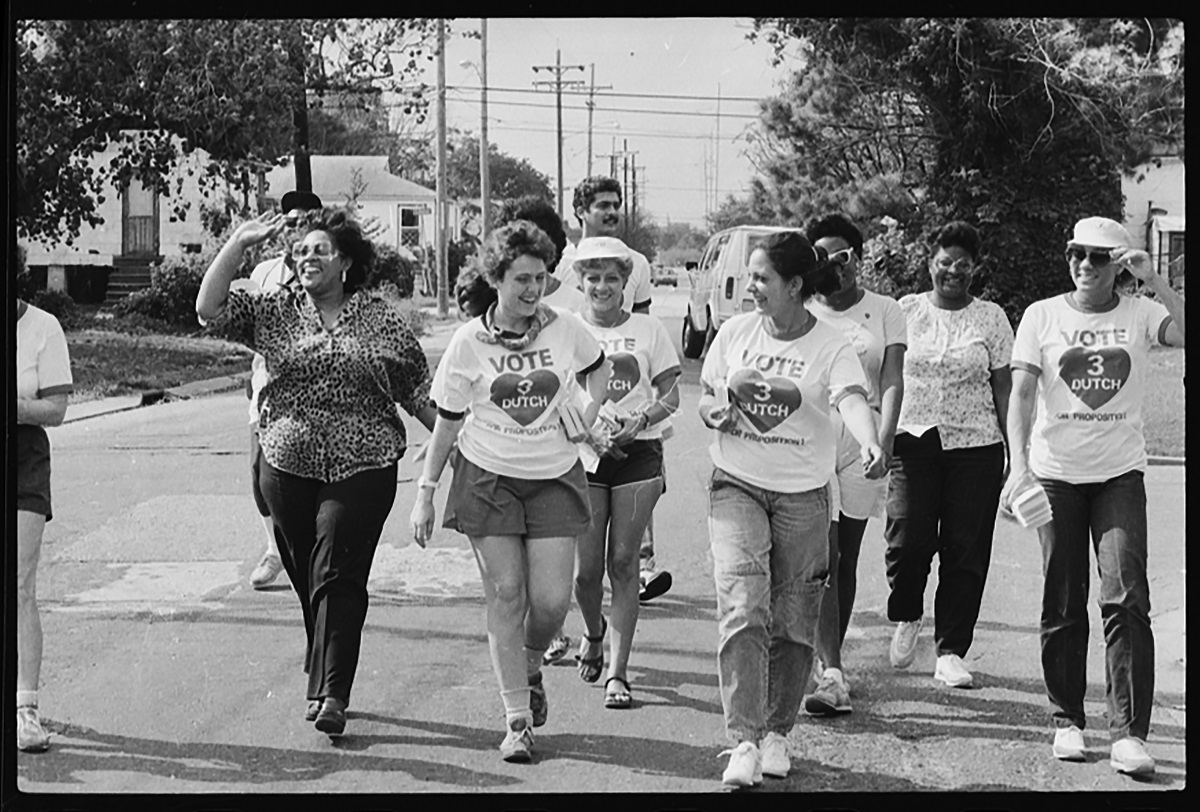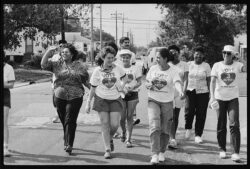Spring 2023
Striving for the Ballot
“Yet She Is Advancing”: New Orleans Women and the Right to Vote, 1878–1970
Published: February 28, 2023
Last Updated: June 1, 2023

The Historic New Orleans Collection, Gift of Harold F. Baquet and Cheron Brylski
Women campaign for Ernest “Dutch” Morial in the Desire Public Housing Development in 1985.
“Yet She Is Advancing”: New Orleans Women and the Right to Vote, 1878–1970, a new exhibition at The Historic New Orleans Collection (THNOC) opening April 28, tells the story of women’s suffrage in New Orleans—a struggle that began in the late 1870s and did not fully conclude until the passage of the Voting Rights Act of 1965. Using objects from THNOC’s holdings as well as loan items from Xavier University and the Amistad Research Center, “Yet She Is Advancing” serves as a companion exhibition to American Democracy: A Great Leap of Faith, a Smithsonian traveling show coming to THNOC in mid-June.
“Yet She Is Advancing” was originally conceived and produced as a virtual exhibition on Google Arts and Culture to commemorate the 100th anniversary of the passage of the 19th Amendment, in 2020. “I am excited to bring this important story to life in the gallery,” said curator Libby Neidenbach. “The show includes an interactive station for visitors to connect our past to present-day concerns about voting. The history of women’s voting-rights activism in New Orleans is complicated, but it is also inspiring and reminds us that we should not take the right to vote for granted.”
The nationwide campaign for women’s suffrage originated at the 1848 Seneca Falls Convention in New York, but in the South the movement did not gain traction until after Reconstruction. “Yet She Is Advancing” covers roughly a century of activism of white and Black women in New Orleans, starting in 1878, when a resident left $1,000 in her will to St. Anna’s Asylum. Overseen by an all-female board, St. Anna’s Asylum provided housing and care for destitute white women and children. Board members witnessed the recording of the will, but the court determined it to be null because women legally could not serve as testamentary witnesses. In her memoir, New Orleans suffragist Caroline Merrick described this revelation as a pivotal event: “The bequest went to the State—and the women went to thinking and agitating.”
In New Orleans, segregated women’s clubs formed the base of suffrage activism. Caroline Merrick founded the first suffrage club for white women in 1892. Most white suffragists in New Orleans wanted the vote for themselves but did not want it extended to Black women. Disagreements over the best tactics for gaining this limited suffrage eventually divided white suffragists in the city. African American women understood women’s suffrage as part of a broader struggle to protect the rights of all Black people, and they created their own organizations, like the Phyllis Wheatley Club. Founded by Sylvanie Williams in 1894, the club advocated not only for women’s suffrage but also for equal access to education, healthcare, and childcare.
The role of Black women and their white allies in the long civil rights movement forms the second, often overlooked, half of the suffrage story for women in New Orleans. In the decades following the passage of the 19th Amendment, New Orleans women of African descent worked hard to exercise their rights as equal citizens, pushing back against voter-suppression tactics such as poll taxes and organizing around voter registration. Following the passage of the 1965 Voting Rights Act, women’s groups like the Louisiana League of Good Government, founded by Sybil Morial, worked to educate newly registered voters to improve the political literacy of the expanding electorate.
The state of Louisiana formally ratified the 19th Amendment in 1970—fifty years after the required thirty-six states approved the law. By this time, women in New Orleans made up a majority of registered voters and began to advance from political organizing to holding elected positions. In 1971, educator and civil rights activist Dorothy Mae Taylor became the first Black woman elected to the Louisiana House of Representatives, and two years later Lindy Boggs became the first Louisiana woman elected to the US Congress.
“Yet She Is Advancing”: New Orleans Women and the Right to Vote, 1878–1970 will be on display April 28–November 5 at 520 Royal Street. Free with ticketed admission. More information at hnoc.org.
